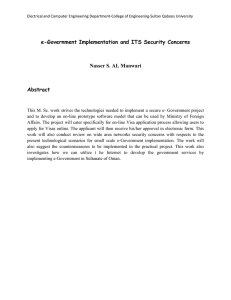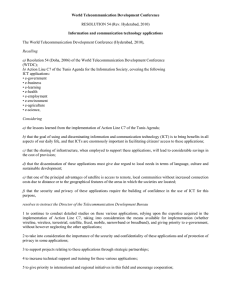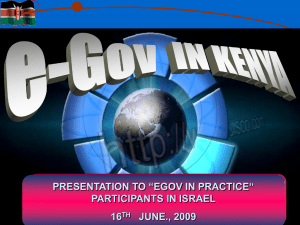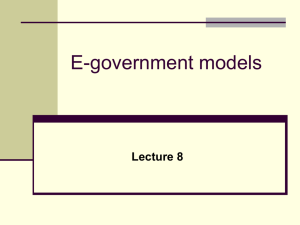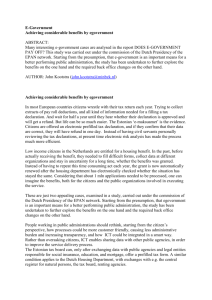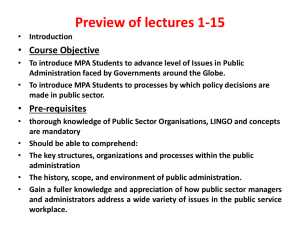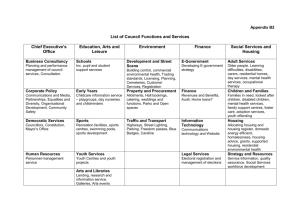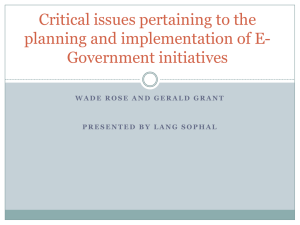World Telecommunication Development Conference More effective adoption of e-government services
advertisement
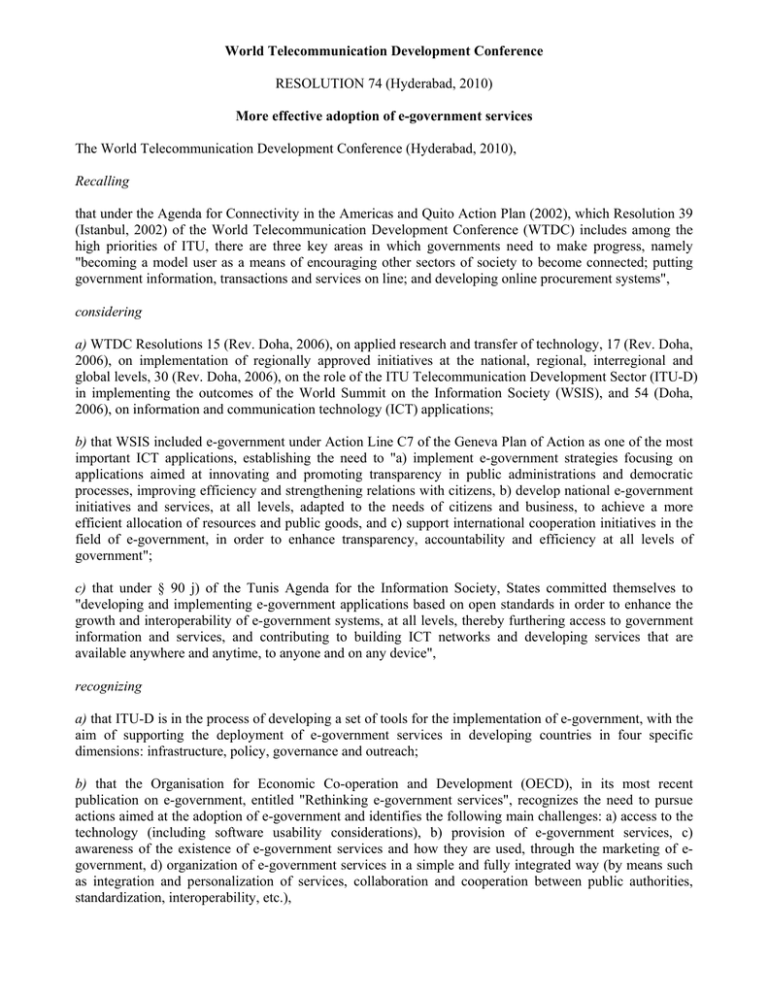
World Telecommunication Development Conference RESOLUTION 74 (Hyderabad, 2010) More effective adoption of e-government services The World Telecommunication Development Conference (Hyderabad, 2010), Recalling that under the Agenda for Connectivity in the Americas and Quito Action Plan (2002), which Resolution 39 (Istanbul, 2002) of the World Telecommunication Development Conference (WTDC) includes among the high priorities of ITU, there are three key areas in which governments need to make progress, namely "becoming a model user as a means of encouraging other sectors of society to become connected; putting government information, transactions and services on line; and developing online procurement systems", considering a) WTDC Resolutions 15 (Rev. Doha, 2006), on applied research and transfer of technology, 17 (Rev. Doha, 2006), on implementation of regionally approved initiatives at the national, regional, interregional and global levels, 30 (Rev. Doha, 2006), on the role of the ITU Telecommunication Development Sector (ITU-D) in implementing the outcomes of the World Summit on the Information Society (WSIS), and 54 (Doha, 2006), on information and communication technology (ICT) applications; b) that WSIS included e-government under Action Line C7 of the Geneva Plan of Action as one of the most important ICT applications, establishing the need to "a) implement e-government strategies focusing on applications aimed at innovating and promoting transparency in public administrations and democratic processes, improving efficiency and strengthening relations with citizens, b) develop national e-government initiatives and services, at all levels, adapted to the needs of citizens and business, to achieve a more efficient allocation of resources and public goods, and c) support international cooperation initiatives in the field of e-government, in order to enhance transparency, accountability and efficiency at all levels of government"; c) that under § 90 j) of the Tunis Agenda for the Information Society, States committed themselves to "developing and implementing e-government applications based on open standards in order to enhance the growth and interoperability of e-government systems, at all levels, thereby furthering access to government information and services, and contributing to building ICT networks and developing services that are available anywhere and anytime, to anyone and on any device", recognizing a) that ITU-D is in the process of developing a set of tools for the implementation of e-government, with the aim of supporting the deployment of e-government services in developing countries in four specific dimensions: infrastructure, policy, governance and outreach; b) that the Organisation for Economic Co-operation and Development (OECD), in its most recent publication on e-government, entitled "Rethinking e-government services", recognizes the need to pursue actions aimed at the adoption of e-government and identifies the following main challenges: a) access to the technology (including software usability considerations), b) provision of e-government services, c) awareness of the existence of e-government services and how they are used, through the marketing of egovernment, d) organization of e-government services in a simple and fully integrated way (by means such as integration and personalization of services, collaboration and cooperation between public authorities, standardization, interoperability, etc.), e) monitoring of outcomes such as the actual use of e-government services and whether expectations regarding the quality of services, internal efficiencies and external effectiveness are met, and f) user trust with respect to the use of sensitive personal information, data and digital identities in terms of the integrity, authenticity and privacy thereof, resolves to instruct the Director of the Telecommunication Development Bureau 1 to ensure that actions will be taken to address and overcome the challenges in implementing projects or activities in e-government; 2 to create and/or update guidelines, tools, strategies and mechanisms conducive to organizational and administrative simplification, collaboration between government authorities, implementation of userfriendly services, integration and personalization of services, use of multiple channels, improvement of the quality of services on the basis of user requirements, marketing of e-government services, protection of personal data and security of e-government transactions; 3 to expedite, in close cooperation with relevant organizations, the definition of a model for Member States for ongoing monitoring and evaluation of the status, usage, quality and impact of egovernment, taking account of relevant work being done by international and regional organizations and by Member States themselves; 4 to promote the sharing of Member States' strategies, best practices, technological platforms and applications, among other things, through a global collaborative network based on the creation and/or strengthening of regional e-government networks; 5 to ensure that the necessary resources within the budgetary limits are allocated to the above actions, invites Member States and Sector Members 1 to incorporate, in their e-government strategies and programmes, actions conducive to organizational and administrative simplification, collaboration between government authorities, implementation of userfriendly services, integration and personalization of services, use of multiple channels, improvement of the quality of services on the basis of user requirements, marketing of e-government services, protection of personal data and security of e-government transactions; 2 to provide the Telecommunication Development Bureau with details of work relating to monitoring and evaluation of the status, usage, quality and impact of e-government; 3 to participate actively in regional and global collaborative forums dealing with experiences and best practices in the implementation of e-government strategies and programmes.
